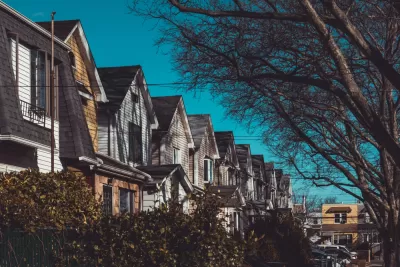As non-owner-occupied homes increase in number in Queens neighborhoods, it's becoming harder for immigrants to afford a first home.

Oscar Perry Abello writes about growing concerns that Queens is losing its identity as a place for immigrants to come to the country and establish a life—the death of the starter home is how the headline describes the stakes.
According to Abello, "community advocates are sounding the alarm that investor dollars are setting off market speculation that threaten to price out the first-time homebuyers, many of them immigrants, that made those neighborhoods such reliable places to sprout roots."
Abello, who has a family history of arriving in Queens to establish a life in the United States, shares news of a report published earlier this year by the Chhaya Community Development Corporation, which "found that mortgages for non-owner-occupied homes in Queens is now roughly triple what it was before the housing market crash of 2008."
"In three key neighborhoods that Chhaya has long considered a safe bet for first-time immigrant homebuyers, non-owner-occupied home mortgages accounted for 20-30 percent of home purchases in 2017," according to Abello. Local advocates are stepping up messaging, as explained in the article, that connects those non-owner-occupied home mortgages to large-scale investors.
Abello also calls attention to the role of the Federal Housing Administration's Distressed Asset Stabilization Program in shifting ownership of much of the borough's housing stock to large investors in the wake of the foreclosure crisis of the Great Recession.
FULL STORY: Is the Starter Home Dead in Queens? Time Is Running Out

Alabama: Trump Terminates Settlements for Black Communities Harmed By Raw Sewage
Trump deemed the landmark civil rights agreement “illegal DEI and environmental justice policy.”

Study: Maui’s Plan to Convert Vacation Rentals to Long-Term Housing Could Cause Nearly $1 Billion Economic Loss
The plan would reduce visitor accommodation by 25% resulting in 1,900 jobs lost.

Why Should We Subsidize Public Transportation?
Many public transit agencies face financial stress due to rising costs, declining fare revenue, and declining subsidies. Transit advocates must provide a strong business case for increasing public transit funding.

Paris Bike Boom Leads to Steep Drop in Air Pollution
The French city’s air quality has improved dramatically in the past 20 years, coinciding with a growth in cycling.

Why Housing Costs More to Build in California Than in Texas
Hard costs like labor and materials combined with ‘soft’ costs such as permitting make building in the San Francisco Bay Area almost three times as costly as in Texas cities.

San Diego County Sees a Rise in Urban Coyotes
San Diego County experiences a rise in urban coyotes, as sightings become prevalent throughout its urban neighbourhoods and surrounding areas.
Urban Design for Planners 1: Software Tools
This six-course series explores essential urban design concepts using open source software and equips planners with the tools they need to participate fully in the urban design process.
Planning for Universal Design
Learn the tools for implementing Universal Design in planning regulations.
Smith Gee Studio
Alamo Area Metropolitan Planning Organization
City of Santa Clarita
Institute for Housing and Urban Development Studies (IHS)
City of Grandview
Harvard GSD Executive Education
Toledo-Lucas County Plan Commissions
Salt Lake City
NYU Wagner Graduate School of Public Service





























